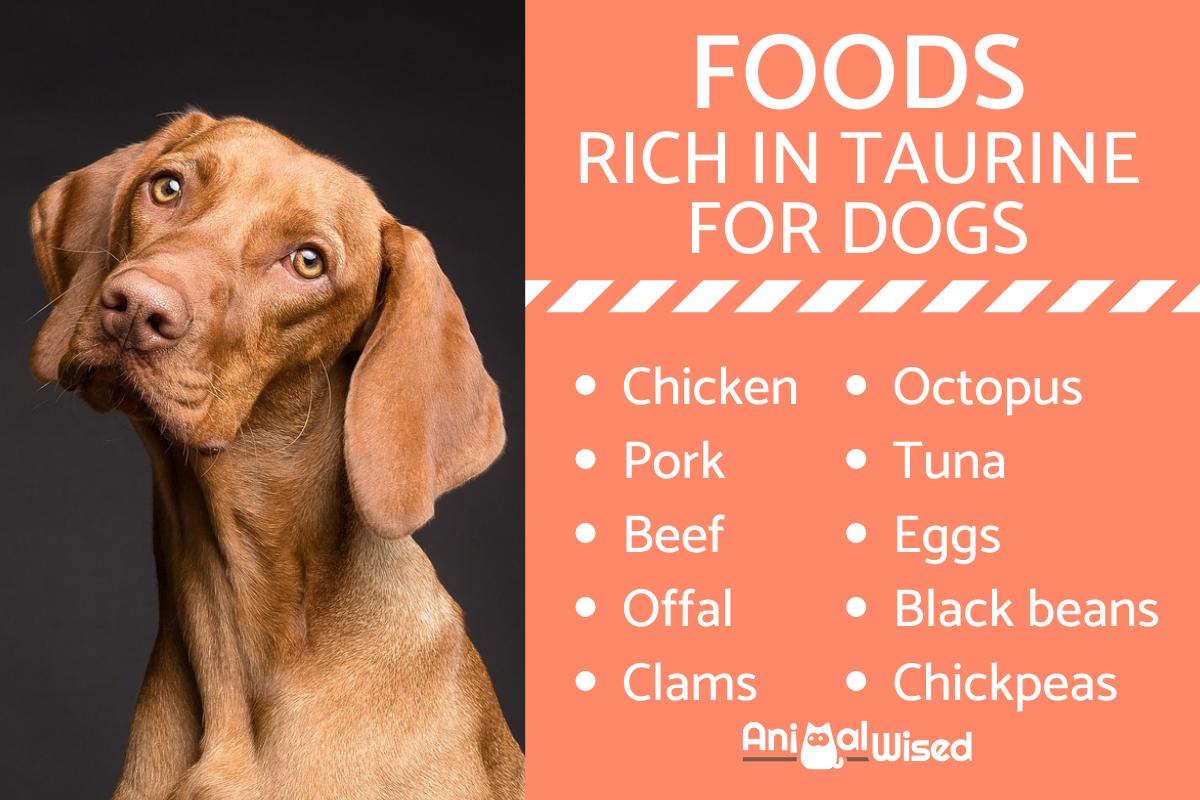Foods Rich in Taurine for Dogs with Heart Problems



See files for Dogs
Maintaining a dog's health is based on various factors, but many of us neglect one of the most important. Diet is fundamental in maintaining a dog's health and preventing potential problems, but dietary changes are also used to treat health issues in dogs. Heart problems in dogs are a particular issue which can be aided greatly with a change in diet, especially when they contain taurine.
Before AnimalWised explains the foods rich in taurine for dogs with heart problems, we need to stress the importance of speaking to a veterinarian for a diagnosis of the heart issue. Some dogs will need much more than taurine-rich foods to treat their problem and there are many other factors to consider.
What is taurine for dogs?
Also known as 2-aminoethanesulfonic acid, taurine is an amino acid which can be found throughout the tissues of a dog's body. Along with 21 other amino acids, taurine helps your dog's body to function properly. While all help to maintain bodily functions, some are considered ‘essential’ and others ‘non-essential’. Taurine is an essential amino acid because the dog's body cannot make it on its own.
Since taurine cannot be synthesized on its own by a dog, they must receive this essential amino acid through their diet. Taurine is found mainly in animal-derived products, but it can be found in lower quantities in plant-based foods. For this reason, many commercial dog food products have added taurine or use ingredients with natural taurine. When dogs cannot get the amount of taurine they need, they may be prescribed taurine supplements by a veterinarian.
Uses of taurine in dogs
Taurine is essential for a dog's body to function and one of its most important functions is pumping blood around the body. A healthy dog will need taurine for their heart to function and dogs with heart problems may need more to compensate for heart defects such as arrhythmias or heart murmurs in dogs.
It can be difficult to know if a dog has problems with their heart. Many of the symptoms of heart failure in dogs are nonspecific, meaning they are shared with other health problems. For this reason, it is vital we take the dog to the veterinarian for a diagnosis. They will prescribe the correct treatment, some of which will require medication if the problem is sufficiently acute. This can include taurine supplements, where necessary.
Some dogs may not require pharmacological treatment, but will need a change in diet to prevent future health issues. This includes providing a diet of foods rich in taurine for dogs with heart problems. Giving the correct food to a dog with heart problems greatly reduces their discomfort and can help maintain heart health. Although some dogs will need medication to treat their heart issue, all will need a suitable diet to prevent heart problems.
For humans, well-known foods that are good for heart conditions include those low in salt and which are relatively high in protein. No dog should have a high-salt diet, but all require relatively high levels of protein to provide the appropriate diet for dogs. However, even this needs to be eaten in the right amount, especially if they have other health issues. For example, dogs with liver disease and kidney failure should not eat too much protein.
Taurine is found in quality dog food, but some brands have insufficient amounts. After carrying out studies on the effect of taurine on canine health, veterinary cardiology service technicians at the University of California, Davis concluded that a taurine deficiency can cause heart diseases[1]. They also state that dogs with heart problems will benefit from a supplement of taurine.
Taurine is beneficial for dogs. Besides helping with heart problems, taurine can:
- Prevent muscle degeneration
- Strengthen the heart muscle
- Prevent arrhythmias
- Improve vision
- Remove harmful substances
As we can see, we need to ensure our dog has sufficient amounts of taurine in their diet to remain healthy, especially if they have heart problems. Below we look at the foods rich in taurine for dogs with heart problems, but reiterate that you must speak to your veterinarian to determine the course of treatment they require.

Animal-based food rich in taurine
Dogs principally eat meat due to a need for protein in their diet. Although they have adapted to eat other foods due to the history of domestication, most commercial dog feed is derived from animal origin. They may include cereals and other ingredients, but the amount will depend on the brand and quality of the food.
Taurine can naturally be found in the following animal-based foods:
- Chicken: especially in the legs, thighs and liver, where there is a greater amount.
- Pork and beef: offal in the form of hearts, liver and kidneys is particularly high in taurine, the relatively low cost of which may be beneficial if you want to make a homemade diet for your dog.
- Eggs and dairy: boiled eggs and cheese have relatively high levels of taurine, although it will depend on the type of cheese. However, the latter especially needs to be eaten in small doses as the high fat salt content of cheese can counteract the benefit of the high levels of taurine.
- Seafood: boiled octopus is a food naturally rich in taurine, as are tuna, clams and certain freshwater fish such as tilapia.
Eating these foods can be beneficial to your dog, but only if they are eaten correctly. Seasonings, preservatives, sugars, fat and other ingredients which are delicious for us are not well digested by dogs. They can lead to problems with obesity which will further exacerbate the dog's heart problems. We also need to avoid certain forbidden food for dogs.
Plant-based food rich in taurine
Generally speaking fruit and vegetables do not contain taurine[2]. This is one of the important reasons that it can be difficult changing your dog to a vegan diet. Many of the human foods which contain taurine are unsuitable for dogs with garlic being a prime example. However, the following are plant-based foods which contain taurine which can be given to dogs with heart problems:
- Brewer's yeast: this can be eaten by dogs, but should be avoided if they have a weakened immune system, are taking certain medications or the vet has prohibited it for any reason. Generally speaking, although rich in taurine, it won't do the dog much good.
- Legumes: chickpeas and black beans are known to contain some levels of taurine. They are not ideal for a dog's diet as they can cause gastrointestinal upset in large amounts, but they are not considered toxic for dogs.
While you can give fruits and vegetables to dogs as part of a balanced diet, they need to be in the right proportion. No proportion will be sufficient to meet the dog's taurine needs, so they will either need to eat animal-based foods or be given taurine supplements by a veterinarian. This is another reason it is obligatory to speak to your veterinarian if you are thinking of changing the dog's diet in any significant way.

Taurine supplements for dogs
In addition to natural food products, taurine supplements can be given to your dog. You should never give them to your dog without express permission from your veterinarian. There are certain health conditions which can prohibit supplements to be given to your dog. We also need to be careful with dog treats as it is possible these may contain additional taurine.
Although it is rare, it is possible you can give your dog taurine intoxication. If your dog is already eating a lot of food rich in taurine and then give them supplements, it can create an imbalance. This can lead to too much taurine, although this is difficult to do with food alone. If the dog already has heart problems or other health issues, it can be particularly complicated.

If you want to read similar articles to Foods Rich in Taurine for Dogs with Heart Problems, we recommend you visit our Homemade diets category.
1. Kaplan, J. L., Stern, J. A., Fascetti, A. J., Larsen, J. A., Skolnik, H., Peddle, G. D., Kienle, R. D., Waxman, A., Cocchiaro, M., Gunther-Harrington, C. T., Klose, T., LaFauci, K., Lefbom, B., Machen Lamy, M., Malakoff, R., Nishimura, S., Oldach, M., Rosenthal, S., Stauthammer, C., O'Sullivan, L., … Ontiveros, E. (2018). Taurine deficiency and dilated cardiomyopathy in golden retrievers fed commercial diets. PloS one, 13(12), e0209112. https://doi.org/10.1371/journal.pone.0209112
2. Pasantes-Morales, H., Quesada, O., Alcocer, L., & Sánchez Olea, R. (1989). Taurine Content in Foods. Nutrition Reports International, 40(4), 793-799.
https://agris.fao.org/agris-search/search.do?recordID=US9022779








